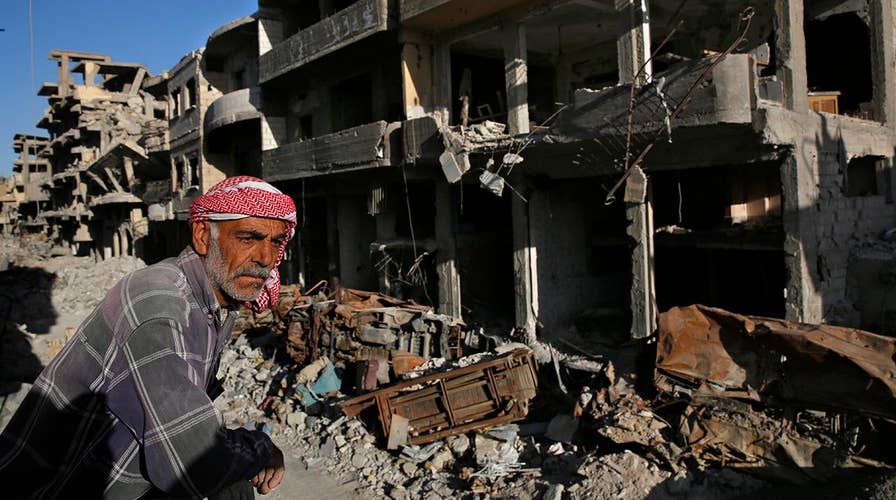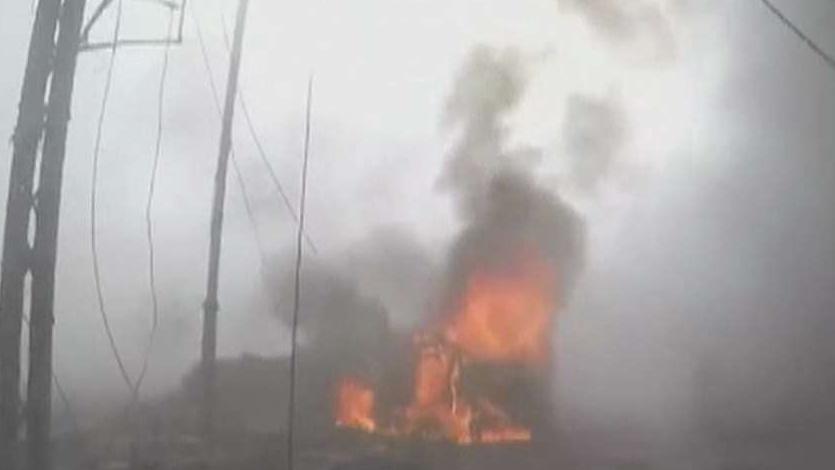Timeline of US policy toward Syria
For the U.S., Syria presents a complicated challenge: defeating ISIS, countering Russia and Iran, while somehow promoting stability; Rich Edson reports from the State Department.
President Trump made clear in a tweet Wednesday morning that America is about to attack Syria very soon – the right course of action after dictator Bashar Assad used bombs filled with toxic chemicals to attack his own citizens Saturday. Assad’s action killed more than 40 people and possibly close to 100, according to anti-Assad forces.
As Fox News reported, the president’s tweet followed reports that Russia's ambassador to Lebanon told a TV station there that Russia will shoot down any American missiles fired at Syrian government targets.
President Trump tweeted Wednesday: “Russia vows to shoot down any and all missiles fired at Syria. Get ready Russia, because they will be coming, nice and new and ‘smart!’ You shouldn’t be partners with a Gas Killing Animal who kills his people and enjoys it!”
A U.S. attack on Syria will send a loud and clear message to the Assad regime and to other nations: America will not tolerate the use of chemical weapons or any other weapon of mass destruction on either armed combatants or civilians.
Sending such a message is enormously important because it will give pause to any other nation that wants to follow in Syria’s path – and hopefully will act as a deterrent.
If Syria suffers no consequences for using deadly chemical weapons banned under international agreements, chances are that other nations will inevitably do the same under desperate circumstances.
If Syria suffers no consequences for using deadly chemical weapons banned under international agreements, chances are that other nations will inevitably do the same under desperate circumstances.
And the more chemical weapons are used by some nations, the greater pressure there would be on other nations to use them as well. This is a truly nightmarish scenario that could claim many lives in conflicts around the world.
I support a U.S. attack on Syria because of its deterrent effect against the use of chemical weapons and also because our strikes against Syria will almost certainly be limited in scope and duration – but will most likely greatly limit Assad’s ability to kill his own people with chemical weapons.
Back in the summer of 2013, I was one of many conservatives who opposed a U.S. attack on Syria in response to Assad’s slaughter of innocent men, women and children with chemical weapons.
I did not take my stand lightly. At the time, I thought a U.S. attack would drag us into a war where America had no clear national interest and only pull Washington into another regime- change disaster.
I feared the U.S. would once again shoulder the heavy burden of rebuilding a society we knew nothing about that had been destroyed by years of war – with a price tag in the hundreds of billions of dollars.
But I was wrong. Very wrong.
Indeed, in the years since Assad’s last mass attack in 2013, using Sarin gas to kill over 1,400 people, events in Syria and around the globe prove why President Trump is right to make a stand against Syria’s use of chemical weapons.
Despite claims that the Assad regime gave up its chemical weapons in a process brokered by Russia during the Obama administration, Assad has clearly reconstituted his chemical weapons capabilities, thanks to help from North Korea.
And it’s uncertain now how many chemical weapons Assad actually ever destroyed under Russian back agreement. Relying on Russia to monitor chemical weapons destruction by its close ally Syria isn’t exactly a foolproof way to guarantee that the destruction took place.
The Syrian regime has launched numerous attacks using chlorine-based weapons that many times get very little media attention. The scale the most recent attack by Assad’s forces – a clear crime against humanity – only proves that the promise of Assad to abandon chemical weapons was worthless.
It doesn’t take much of an imagination to envision other rogue regimes following Syria’s example in turning to chemical weapons.
North Korea, for example – in what should be considered a terror attack – has already used the highly lethal chemical VX in the targeted assassination of dictator Kim Jong Un’s half-brother.
Sadly, the international community, already reeling from Pyongyang’s other provocative actions of 2017 – specifically, testing missiles and nuclear weapon – did very little in responding to this brazen violation of international law, further eroding what should be a clear norm that such weapons should never be used.
And then there are Russia’s most recent actions, using chemical weapons on British soil, in an attempt to assassinate dissidents in what could be considered an act of war. While Moscow offers the most brazen of denials, it seems clear that the regime of President Vladimir Putin – seeing other nations’ usage of chemical weapons bringing no punishment – thought it would get away with such an act.
Yet some Americans argue passionately and with conviction that we must avoid attacking the Assad regime at all costs. They say a U.S. attack on Syria would show we are determined to launch a long and costly war of regime change – possibly putting America in a direct conflict with Russia and further destabilizing the already unstable Middle East.
I would respectfully disagree. Precision American missile strikes, with the clear goal of eliminating Assad’s chemical weapons capabilities – targeting his air force, artillery and anything else that can launch chemical weapons – does not constitute regime change.
While I have no love for the Syrian government and would be happy to see its demise, history tells us that forcing Assad out of power would only make the collective problems of the Syrian people and the wider Middle East far worse.
Also, removing Assad can’t be accomplished by missiles and bombs from the air alone, but only by U.S. troops – perhaps as many as hundreds of thousands of them.
Such an action wouldn’t be just a strike against Syria – it would be a total war. And as history clearly proves, such a war would risk creating a zone of instability from the shores of the Mediterranean to the Persian Gulf – as happened when we forced regime change in Iraq.
A U.S. war against Syria would also guarantee deaths and injuries to U.S. forces and could tie us down in Syria for years, at the cost of many billions of dollars.
But I believe we can and will learn from our mistakes at that a limited strike will not turn into a long war in Syria.
As for a potential clash with Russia if we hit Syria, we must state clearly to Moscow our intent –and that we have no desire for armed conflict with Russia. We should remind the Putin government that the current crisis with Syria is largely a product of its own doing.
It was Russia that decided to intervene, en masse, in the current crisis in Syria back in 2015. And Russia has done nothing to restrain or eliminate Assad’s rebuilt or hidden chemical weapons capability – something it claimed it was trying to eliminate.
Despite Russia’s clear fueling of a civil war in Syria that has claimed roughly 400,000 lives, the Trump administration should make it clear it will do all it can to avoid Moscow’s forces in region. And when possible – even if it means giving up the element of surprise – we should warn the Putin government if its forces are near potential U.S. targets.
Clearly, no one, including President Trump, wants to see another conflict widen in the Middle East. In fact, if anything, the president’s determination to leave Syria makes it clear he will not embroil America in another war for regime change in that part of the world.
However, President Trump – through what will most likely be a targeted mission to stop Assad from slaughtering his own people with chemical weapons – has now placed a clear line in the sand that the use of such weapons of mass destruction constitutes a crime against humanity.
That’s the right thing to do and America needs to support our president for his courageous action.


